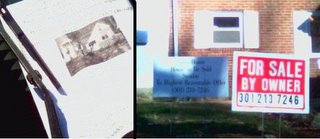 The house is listed on the MLS ( MC5465375 ) for 510K. It has 4br 2bath. It was built in 1947. It is located about 2/3 of a mile from downtown Silver Spring. The neighborhood is alright. It is located next to some slightly rundown apartment buildings.
The house is listed on the MLS ( MC5465375 ) for 510K. It has 4br 2bath. It was built in 1947. It is located about 2/3 of a mile from downtown Silver Spring. The neighborhood is alright. It is located next to some slightly rundown apartment buildings.So the owner has decided that it needs to be sold they put up signs stating 'Open House, House to be Sold Sunday, To Highest Reasonable Offer'

Handout flyers were even placed on cars in the neighborhood. In the flyers it said the house was open on Saturday and Sunday and that on Sunday night it would be sold to the 'highest reasonable offer.'
- So how much will they be offered for the property?
- What will they consider a 'reasonable offer'?





The owner listed it for 510K. Perhaps they would accept a 459K offer or 10% less.
ReplyDelete230K...NO MORE..TAKE IT OR LEAVE IT.
ReplyDeleteI like the way anon above thinks.
ReplyDeleteThat price (230K) would have been very reasonable only five years ago.
If you really believe there is a bubble, then real prices are going to come down more than 10%. If there really was a bubble, then prices are coming down 40-50 percent, but it may take 5-6 years. But who knows?
Chip: Saying best "reasonable offer" will be accepted is not surplusage. It is based on sound legal advice. Hypothetical: If best offer is $50K, offeror would have legally enforceable right to sue for title. However, as $50K is not reasonable, offeror would have no such right. Cases on effect of such qualification are many....Jerry
ReplyDeleteMy understanding of contract law is that a listing price or asking price is just a mere invitation to bid. In other words, it is not a legally binding promise to sell.
ReplyDeleteThere is also something called the Statute of Frauds that requires real estate contracts to be signed to be enforcable. You can't bind a seller without a signed contract.
Not from the area so wouldn't be interested in buying this place.
ReplyDeleteBUT if I was interested, I'd look up the history of the place , found out what present owner bought it for and when and then take it from there. (ie. add normal, not bubble, appreciation and maybe throw some $ on top cuz this person, I think, should be rewarded for
jumping in with a bold plan at this juncture.
I don't know about DC, but these fools in Seattle are putting stuff on the market at prices that they've GOT TO KNOW by now is never going to sell. Idiots.
I like this sellers' gumption and hope they sell the house at a fair price for both seller and buyer.
Dear Statute of Frauds Commenter:
ReplyDeleteThere was a time when I was paid to offer legal advice; this is not one. Nor was I earlier doing so.
However, I would like to comment based upon my feeble recollection.
The Statute of Frauds requires only that certain contracts, including especially those pertaining to real estate, be "evidenced in writing." The entire contract need not be set forth in single writing.
As far as "offer" v. "acceptance" is concerned: In general, a seller's "offer" is really only an invitation for bids (offers). Thus, the potential buyer's contract is presented as an offer, to be accepted or rejected by the seller. However...
...When I last was involved in issues such as these (years ago), there was no "law" that required that the seller be the acceptor and that the buyer be the offeror. As adults, the parties are free to work out whatever arrangement they want. There are times when the seller becomes the offeror; all that is needed is "I accept" in proper form. A counter-offer made by the would be seller is typical of this role reversal. Othertimes, the would be seller can set forth sufficient detail in their offer that a mere "acceptance" by the buyer, coupled with some compensation or offer of same, may be sufficient.
There was a doctrine of "specific performance." Because of its uniqueness, a person wrongfully deprived of real estate may sue for title; i.e., to enforce a sale. The fact that the would be buyer may have been the "offeror" did not defeat the claim, provided they could show the existence of a contract, evidenced in writing, by the party to be charged (seller) specifically describing the property to be conveyed, for a compensation agreed to be paid by the would be buyer.
In the ad at issue, the seller modified his status by stating unequivocally what the agreed upon compensation would be. The property was described; the amount of the acceptable offer ("best reasonable") was stated. No special terms were required to "accept," other than to meet the seller's requirements, and comply with applicable legal requirements (such as the Statute of Frauds).
Anyway, conceding for the sake of argument that you are correct with respect to the Statute of Frauds, I was addressing the issue regarding whether or not the word "best" was surplusage. In my opinion, it was not; it was a term of art routinely used by many offerors who did not wish to be sued for rejecting a clearly unreasonable offer.
Anyway, I recommend that a licensed attorney be conducted on these issues....Jerry
Hey Jerry ... I too am a former lawyer, but have been out of it for 15 years so my memory is foggy at best. Absent full performance etc., I believe the contract (writing) has to be "signed" by the party to be charged. Not to split hairs - who cares anyway.
ReplyDeleteThere are, however, alot of buyers who can't understand why if a house is listed at x-price the seller is not required to accept that price when offered.
Anywho...glad to be out of the legal game. I have been a real estate investor since (and before). No clients, no agents...ahh.
Hi, Annonymous (Reply to "Hey Jerry]: I've been out of practice for longer than you have been. If you take me at my word, I originally had "by the party to be charged" in my comment. I deleted for a variety of reasons. Two of them follow:
ReplyDeleteFirst, the party to be charged is, in fact, the seller. Thus, the Statute of Frauds would require that the seller be the one who evidenced the writing. Therefore, as the term "best reasonable offer" was the seller's, it went without saying that the seller was the party to be charged (I didn't want to overcomplicate my narration, so I made things simple).
The second point is a bit more involved, based on actual experience. In law school, I had been taught that the "evidence in writing" requirement of the Statute of Frauds meant that the contract itself, including all relevant terms, had to be in writing. Not so.
Years ago, a U.S. District Court ruled that, reducing verbal testimony to a written deposition transcript, during the course of the actual litigation in which the real property was in issue, itself was "evidence in writing" of the existence of the contract. The deposition transcript not only was not the contract, but it didn't contain all the nuances one traditionally saw in a real estate contract. Rather, the court found sufficient that the contract, and all of its oral terms--implicit and explicit--were "evidenced" by the sworn testimony once reduced to a transcript. I thought the decision odd at the time, but if I recall correctly, the legal authorities were in accord.
Later...Jerry
Hey Jerr... what are you up to these days now that you don't practice law? I note that you read this site; are you an investor?....another former esq.
ReplyDeleteHi. Investor? Nah; other than some dabbling in stock market.
ReplyDeleteAnyway, I had (past tense) been trying to purchase a house in DC area for quite a while. Everytime I saved enough for a down payment, I ran into a lousy (corrupt?) broker. Didn't matter if it was a so-called "buyer's" agent.
I believe that they bear the lion's share of responsibility in the run up. "Let's see, property sold for $300K last week, so it now should be worth $325K..."
My favorite story (true): Circa 2000. I had been preapproved for $300K. My buyer's agent knew that. My buyer's agent calls me: New listing: $275. I leave work immediately, take taxi. I see house. "I don't even have to look inside," I say. I tell agent to write contract for $275K. "You'll never get it for that. Offer more." "How much more"? Agent is silent. I ask agent what happened between time she called and time I arrived to warrant increase? Again silence. "O.K., I'll offer $285."
What happened? Never heard back from agent. I call. Agent unavailable. I leave message. No reply. Eventually, agent does respond. Tells me property was sold. "For how much." Familiar silence.
Months later, I learn that property sold for $288K! My prequalified offer of $285 apparently had been used to get someone to bid a few bucks more. No interest whatever in helping me. Just making a quick buck.
I'm sure some people will say that agent acted O.K., that I have no right to complain, that seller could reject my bid, etc. My opinion: That's all baloney. Buyer's agent was to represent me. I was not participating in an outcry auction, and if my initial offer was too low, agent could have written contract offer in a manner consistent with my $300K authorization.
Apologies for digression....Jerry
Jerry - I will in no way defend your agent. It is, however, every man for himself in this world. Your agent should have used an escalation clause if you really wanted the peoperty. I have always found my own deals and just have an agent to write it up. I get a rebate of 2.5% of my agent's 3%. ...another former esq.
ReplyDeleteWhat makes the house worth even $510,000 when it sold on 11/09/05 for $295,125! Looks like a flipper to me. Either that or someone in the family "sold" it to someone else in the family and the new owner is trying to make a quick profit.
ReplyDeleteHere are the prices this house has sold at in the past:
11/09/2005 $295,125
06/14/1996 $215,000
07/27/1995 $117,300
Which leads to the next question...
What is wrong with this house? Is the owner (Nicole Hislop) allowing inspections or is it "as is"?
You can get these numbers yourself at the Maryland Real Property Data Search site.
http://sdatcert3.resiusa.org/rp_rewrite/results.asp?streetNumber=513&streetName=thayer&county=16&intMenu=2&SearchType=Street&submit4=SEARCH
Maybe the seller bought it as a "distress" sale. Who knows. Clearly the 215k price in 1996 does not equate with the 11/05 price of 295K. 500k seems to be more in line with the appreciation since 1996.
ReplyDelete